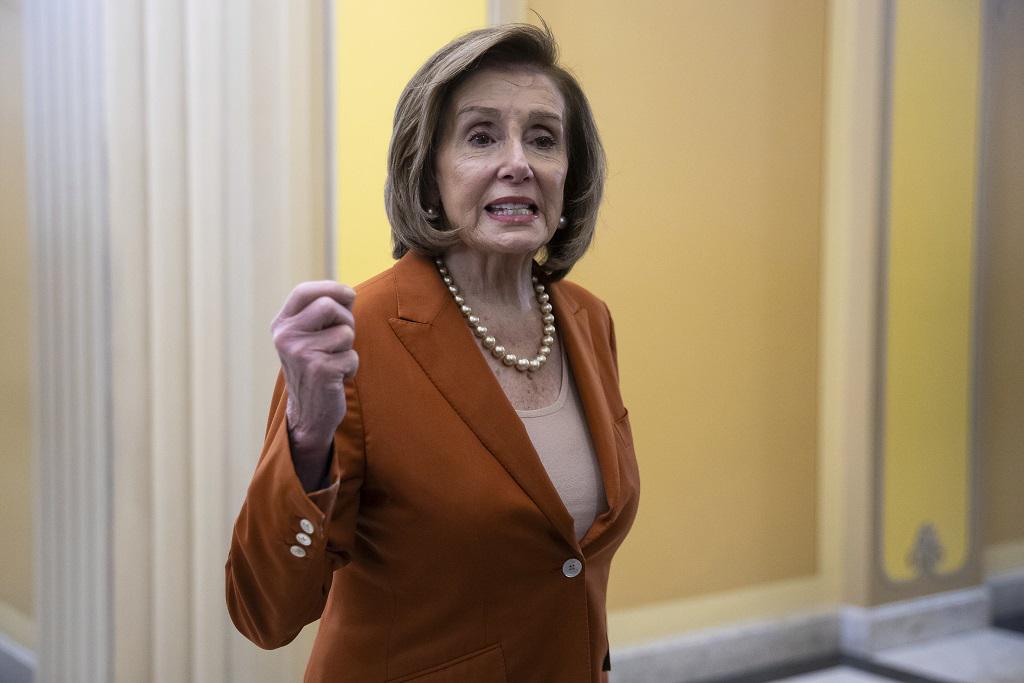Regulation
Pelosi Could Support Industry-Friendly Domestic Crypto Bill

Speaker Emeritus Nancy Pelosi (D-CA) plans to vote for a Republican-backed crypto bill when it comes to a vote this week in the House, according to sources familiar with her thinking.
The bill, known as Financial Innovation and Technology for the 21st Century Act (FIT 21), was developed by Republicans on the House Financial Services Committee and represents the most comprehensive effort to date to regulate crypto, primarily from an industry perspective. The bill could also open loopholes for other financial instruments outside of crypto, experts say. Perspective. A Rules Committee Meeting on FIT 21 will take place later today, with in-room voting likely as early as Wednesday.
Pelosi is no longer part of the Democratic leadership, but her views still carry weight among many House Democrats. She also remains one of the Democratic Party’s most prodigious fundraisers, at a time when the crypto industry has brought in large sums of campaign contributions over the past two election cycles. The decision by House Republicans to give FIT 21 a vote allows these crypto PACs to definitively see where members of Congress stand on the issue before November and target spending accordingly.
If Pelosi supports the bill, she would break with the ranking Democrat on the Financial Services Committee, Rep. Maxine Waters (D-CA), who opposes FIT 21, as well as Rep. Brad Sherman (D- CA), another senior member. in Pelosi’s California delegation. In a communication to House Democrats, leaders did not say they would pass the bill, but only indicated that Waters and other prominent members “strongly” oppose it.
In 2022, Pelosi led the House Majority PAC, the super PAC supporting House Democrats, when he received 6 million dollars of disgraced crypto-billionaire Sam Bankman-Fried to support a candidate in an open-seat Democratic primary in Oregon. (That candidate, Carrick Flynn, lost the primary.) Pelosi personally received $2,900 by Nishad Singh, director of engineering for FTX, Bankman-Fried’s failed crypto exchange.
Coinbase, a leading exchange, no longer has a physical office but spent the first eight years of its life as a company based in Pelosi’s San Francisco district. Coinbase CEO Brian Armstrong has previously pushed for more lenient crypto regulation in Washington, even take a selfie with Pelosi in 2021. The company name appears on a coalition letter endorsing FIT 21 which was sent to House leaders last week.
In response to a question from PerspectivePelosi spokesman Aaron Bennett said he did not yet have an answer on his position on the bill.
FIT 21 ADDRESS THE THRESHOLD QUESTION in crypto regulation: what counts as a commodity and is therefore regulated by the Commodity Futures Trading Commission (CFTC), and what counts as a security, with oversight given to the Securities and Exchange Commission (SEC), more strict.
The bill would define all digital assets on a “decentralized” blockchain as a commodity and also give the CFTC regulatory authority over crypto cash or cash markets. This definition means that most digital currencies and coins would be subject to the CFTC’s regulatory regime, and even for crypto assets defined as securities, there would be several exceptions to SEC regulation. Stablecoins, which are pegged to the dollar and are used to facilitate cryptocurrency trading, would have only limited federal regulatory oversight.
In other words, the bill delivers what the industry has been seeking for some time: a regulatory regime largely dominated by the CFTC, which has been much more accommodating to the industry. The coalition’s letter said the legislation would help “accelerate the growth of blockchain technology and digital assets, promoting financial inclusion and protecting national security.”
Waters and other Democrats held a briefing with members and staff on FIT 21 on Monday, strongly rejecting the measure. Financial reform groups have been attack him During months. “This is a bill that, instead of creating regulatory standards for the crypto industry, attempts to rewrite financial regulation to benefit crypto,” says Mark Hays, senior fintech policy analyst at Americans for Financial Reform.
The bill delivers what the industry has been seeking for some time: a regulatory regime largely dominated by the CFTC, which has been much more accommodating to the industry.
In particular, advocates challenge Title II of the bill, which would modify the “Howey test» to determine what counts as security. The Howey test says that an “investment of money in a common enterprise, with a reasonable expectation of profits from the efforts of others” is a security. But FIT 21 would change this standard, in effect since the Securities Exchange Act of 1934, for digital assets. This would keep them out of SEC oversight.
Hays says this “creates a roadmap for other players on Wall Street to use the same rubric,” meaning other investment contracts could be drafted outside of crypto whose assets would be exempt from the securities laws.
Pelosi may not have 90-year-old financial regulatory laws in mind when evaluating the bill, but rather the realities of 21st century elections. As THE Perspective reported, Bankman-Fried’s conviction for criminal fraud has not slowed down the cryptocurrency train in the Democratic primaries. As of April, the industry had raised $80 million for the 2024 elections. Many Democratic members have recently been elected, from Sen. John Fetterman (D-PA) to Rep. Ritchie Torres (D-NY), himself a sponsor from FIT 21, with the support of the crypto industry.
This effort has paid off for crypto companies. Thirty-two Democrats in the House and Senate joined the Republicans last week to vote to rescind the SEC’s guidance on crypto accounting, a resolution that President Biden has vowed to veto. Pelosi was not one of the 21 House Democrats who voted for the resolution, but on the Senate side, Majority Leader Chuck Schumer (D-NY) was among the votes yes.
Schumer also unsuccessfully attempted to make a deal in the FAA reauthorization bill to include industry-favored legislation regulating stablecoins. There was speculation that Schumer was trying to protect Democratic Senators Sherrod Brown (D-OH) and Jon Tester (D-MT), who were threatened with campaign spending of the crypto industry against their re-elections.
During his Senate race this year, Rep. Adam Schiff (D-CA), a Pelosi protégé, added pro-crypto messaging on his campaign website, saying he would ensure that “the United States remains the world leader in these important new technologies.” As a result, he received an “A” rating from an outside group called Stand With Crypto, and his primary Democratic opponent, Rep. Katie Porter (D-CA), received $10 million in negative ads funded by the industry.
Several House Democrats have already lined up to support FIT 21, including Rep. Ro Khanna (D-CA) and Reps. Torres’ co-sponsors Wiley Nickel (D-NC) and Henry Cuellar (D-TX), who was recently charged with corruption. Support from House Democrats could determine whether the Senate feels the need to pass the bill, although that currently appears unlikely. Pelosi’s decision would largely determine where those numbers end up.
According to Hays, the potential financial windfall from supporting crypto and the assaults aimed at opposing it are driving Democratic decision-making. “It’s not about supporting crypto, it’s about trying to deal with the threat of super PAC promises.”
Regulation
Crypto community gets involved in anti-government protests in Nigeria

Amid the #EndBadGovernanceInNigeria protests in Nigeria, a notable shift is occurring within the country’s cryptocurrency sector. As the general public demands sweeping governance reforms, crypto community leaders are seizing the opportunity to advocate for specific regulatory changes.
Rume Ophi, former secretary of the Blockchain Stakeholders Association of Nigeria (SiBAN), stressed the critical need to integrate crypto-focused demands into the broader agenda of the protests.
Ophi explained the dual benefit of such requirements, noting that proper regulation can spur substantial economic growth by attracting investors and creating job opportunities. Ophi noted, “Including calls for favorable crypto regulations is not just about the crypto community; it’s about leveraging these technologies to foster broader economic prosperity.”
Existing government efforts
In opposition to Ophi’s call for action, Chimezie Chuta, chair of the National Blockchain Policy Steering Committee, presents a different view. He pointed out The Nigerian government continued efforts to nurture the blockchain and cryptocurrency industries.
According to Chuta, the creation of a steering committee was essential to effectively address the needs of the crypto community.
Chuta also highlighted the creation of a subcommittee to harmonize regulations for virtual asset service providers (VASPs). With the aim of streamlining operations and providing clear regulatory direction, the initiative involves cooperation with major organizations including the Securities and Exchange Commission (SEC) and the Central Bank of Nigeria (CBN). “Our efforts should mitigate the need for protest as substantial progress is being made to address the needs of the crypto industry,” Chuta said.
A united call for support
The ongoing dialogue between the crypto community and government agencies reflects a complex landscape of negotiations and demands for progress.
While actors like Ophi are calling for more direct action and the inclusion of crypto demands in protest agendas, government figures like Chuta are advocating for recognition of the steps already taken.
As protests continue, the crypto community’s push for regulatory reform highlights a crucial aspect of Nigeria’s broader fight to improve governance and economic policies. Both sides agree that favorable regulations are critical to the successful adoption and implementation of blockchain technologies, signaling a potentially transformative era for Nigeria’s economic framework.
Read also : OKX Exchange Exits Nigerian Market Amid Regulatory Crackdown
Regulation
Cryptocurrency Regulations in Slovenia 2024

Slovenia, a small but highly developed European country with a population of 2.1 million, boasts a rich industrial history that has contributed greatly to its strong economy. As the most economically developed Slavic nation, Slovenia has grown steadily since adopting the euro in 2007. Its openness to innovation has been a key factor in its success in the industrial sector, making it a prime destination for cryptocurrency enthusiasts. Many believe that Slovenia is poised to become a powerful fintech hub in Europe. But does its current regulatory framework for cryptocurrencies support such aspirations?
Let’s explore Slovenia’s cryptocurrency regulations and see if they can propel the country to the forefront of the cryptocurrency landscape. My expectations are positive. What are yours? Before we answer, let’s dig a little deeper.
1. Cryptocurrency regulation in Slovenia: an overview
Slovenia is renowned for its innovation-friendly stance, providing a supportive environment for emerging technologies such as blockchain and cryptocurrencies. Under the Payment Services and Systems Act, cryptocurrencies are classified as virtual assets rather than financial or monetary instruments.
The regulation of the cryptocurrency sector in Slovenia is decentralized. Different authorities manage different aspects of the ecosystem. For example, the Bank of Slovenia and the Securities Market Agency oversee cryptocurrency transactions to ensure compliance with financial laws, including anti-money laundering (AML) and terrorist financing regulations. The Slovenian Act on the Prevention of Money Laundering and Terrorist Financing (ZPPDFT-2) incorporates the EU’s 5th Anti-Money Laundering Directive (5MLD) and aligns with the latest FATF recommendations. All virtual currency service providers must register with the Office of the Republic of Slovenia.
2. Cryptocurrency regulation in Slovenia: what’s new?
Several notable developments have taken place this year in the cryptocurrency sector in Slovenia:
July 25, 2024:Slovenia has issued a €30 million on-chain digital sovereign bond, the first of its kind in the EU, with a yield of 3.65%, maturing on 25 November 2024.
May 14, 2024:NiceHash has announced the first Slovenian Bitcoin-focused conference, NiceHashX, scheduled for November 8-9 in Maribor.
3. Explanation of the tax framework for cryptocurrencies in Slovenia
The Slovenian cryptocurrency tax framework provides clear guidelines for individuals and businesses. According to the Slovenian Financial Administration, the tax treatment depends on the status of the trader and the nature of the transaction.
- People:Income earned from cryptocurrencies through employment or ongoing business activities is subject to personal income tax. However, capital gains from transactions or market fluctuations are exempt from tax.
- Companies:Capital gains from cryptocurrency-related activities are subject to a 19% corporate tax. Value-added tax (VAT) generally applies at a rate of 22%, although cryptocurrency transactions that are considered as means of payment are exempt from VAT. Companies are not allowed to limit payment methods to cryptocurrencies alone. Tokens issued during ICOs must follow standard accounting rules and corporate tax law.
4. Cryptocurrency Mining in Slovenia: What You Need to Know
Cryptocurrency mining is not restricted in Slovenia, but income from mining is considered business income and is therefore taxable. This includes rewards from validating transactions and any additional income from mining operations. Both individuals and legal entities must comply with Slovenian tax regulations.
5. Timeline of the development of cryptocurrency regulation in Slovenia
Here is a timeline highlighting the evolution of cryptocurrency regulations in Slovenia:
- 2013:The Slovenian Financial Administration has issued guidelines stating that income from cryptocurrency transactions should be taxed.
- 2017:The Slovenian Financial Administration has provided more detailed guidelines on cryptocurrency taxation, depending on factors such as the status of the trader and the type of transaction.
- 2023:The EU adopted the Markets in Crypto-Assets (MiCA) Regulation, establishing a uniform regulatory framework for crypto-assets, their issuers and service providers across the EU.
Endnote
Slovenia’s approach to the cryptocurrency sector is commendable, reflecting its optimistic view of the future of cryptocurrencies. The country’s balanced regulatory framework supports cryptocurrency innovation while protecting users’ rights and preventing illegal activities. Recent developments demonstrate Slovenia’s commitment to continually improving its regulatory environment. Slovenia’s cryptocurrency regulatory framework sets a positive example for other nations navigating the evolving cryptocurrency landscape.
Read also : Hong Kong Cryptocurrency Regulations 2024
Regulation
A Blank Sheet for Cryptocurrencies: Kamala Harris’ Regulatory Opportunity

photo by Shubham Dhage on Unsplash
As the cryptocurrency landscape continues to evolve, the need for clear regulation has never been more pressing.
With Vice President Kamala Harris now leading the charge on digital asset regulation in the United States, this represents a unique opportunity to start fresh. This fresh start can foster innovation and protect consumers. It can also pave the way for widespread adoption across industries, including real estate agencies, healthcare providers, and online gaming platforms like these. online casinos ukAccording to experts at SafestCasinoSites, these platforms come with benefits such as bonus offers, a wide selection of games, and various payment methods. Ultimately, all this increase in adoption could propel the cryptocurrency market forward.
With this in mind, let’s look at the current state of cryptocurrency regulation in the United States, a complex and confusing landscape. Multiple agencies, including the Securities and Exchange Commission (SEC), the Commodity Futures Trading Commission (CFTC), and the Financial Crimes Enforcement Network (FinCEN), have overlapping jurisdictions, creating a fragmented regulatory environment. This lack of clarity has stifled innovation as companies are reluctant to invest in the United States, fearing regulatory repercussions. A coherent and clear regulatory framework is urgently needed to realize the full potential of cryptocurrencies in the United States.
While the US struggles to find its footing, other countries, such as Singapore and the UK, are actively looking into the cryptocurrency sector by adopting clear and supportive regulatory frameworks. This has led to a brain drain, with companies choosing to locate in more conducive environments.
Vice President Kamala Harris has a unique opportunity to change that narrative and start over. Regulation of cryptocurrencies. By taking a comprehensive and inclusive approach, it can help create a framework that balances consumer protection with innovation and growth. The time has come for clear and effective regulation of cryptocurrencies in the United States.
Effective regulation of digital assets is essential to foster a safe and innovative environment. The key principles guiding this regulation are clarity, innovation, global cooperation, consumer protection, and flexibility. Clear definitions and guidelines eliminate ambiguity while encouraging experimentation and development to ensure progress. Collaboration with international partners establishes consistent standards, preventing regulatory arbitrage. Strong safeguards protect consumers from fraud and market abuse, and adaptability allows for evolution in response to emerging trends and technologies, striking a balance between innovation and protection.
The benefits of effective cryptocurrency regulation are multiple and far-reaching. By establishing clear guidelines, governments can attract investors and mainstream users, driving growth and adoption. This can, in turn, position countries like the United States as global leaders in fintech and innovation. Strong safeguards will also increase consumer confidence in digital assets and related products, increasing economic activity.
A thriving crypto industry can contribute significantly to GDP and job creation, which has a positive impact on the overall economy. Furthermore, effective regulation has paved the way for the growth of many businesses such as tech startups, online casinos, and pharmaceutical companies, demonstrating that clear guidelines can open up new opportunities without stifling innovation. This is a great example of how regulation can allay fears of regressive policies, even if Kamala Harris does not repeal the current progressive approach. By adopting effective regulation, governments can create fertile ground for the crypto industry to thrive, thereby promoting progress and prosperity.
Regulation
South Korea Imposes New ‘Monitoring’ Fees on Cryptocurrency Exchanges

Big news! The latest regulatory changes in South Korea are expected to impact major cryptocurrency exchanges like Upbit and Bithumb. Under the updated regulations, these platforms will now have to pay monitoring fees, which could cause problems for some exchanges.
Overview of new fees
In the latest move to regulate cryptocurrencies, the Financial Services Commission announced on July 1 the revised “Enforcement Order of the Act on the Establishment of the Financial Services Commission, etc.” update “Regulations on the collection of contributions from financial institutions, etc.” According to local legislation newsThe regulations require virtual asset operators to pay supervisory fees for inspections conducted by the Financial Supervisory Service starting next year. The total fees for the four major exchanges are estimated at around 300 million won, or about $220,000.
Apportionment of costs
Upbit, which holds a dominant market share, is expected to bear more than 90% of the total fee, or about 272 million won ($199,592) based on its operating revenue. Bithumb will pay about 21.14 million won ($155,157), while Coinone and GOPAX will contribute about 6.03 million won ($4,422) and 830,000 won ($608), respectively. Korbit is excluded from this fee due to its lower operating revenue.
Impact on the industry
The supervision fee will function similarly to a quasi-tax for financial institutions subject to inspections by the Financial Supervisory Service. The new law requires any company with a turnover of 3 billion won or more to pay the fee.
In the past, fees for electronic financial companies and P2P investment firms were phased in over three years. However, the taxation of virtual asset operators has been accelerated, reflecting the rapid growth of the cryptocurrency market and increasing regulatory scrutiny.
Industry reactions
The rapid introduction of the fee was unexpected by some industry players, who had expected a delay. Financial Supervisory Service officials justified the decision by citing the creation of the body concerned and the costs already incurred.
While larger exchanges like Upbit and Bithumb can afford the cost, smaller exchanges like Coinone and GOPAX, which are currently operating at a loss, could face an additional financial burden. This is part of a broader trend of declining trading volumes for South Korean exchanges, which have seen a 30% drop since the new law went into effect.
-

 Regulation12 months ago
Regulation12 months agoRipple CTO and Cardano founder clash over XRP’s regulatory challenges ⋆ ZyCrypto
-

 Regulation10 months ago
Regulation10 months agoNancy Pelosi Considers Supporting Republican Crypto Bill FIT21 – London Business News
-

 Videos11 months ago
Videos11 months agoCryptocurrency News: Bitcoin, ETH ETF, AI Crypto Rally, AKT, TON & MORE!!
-

 Regulation11 months ago
Regulation11 months agoBitcoin’s future is ‘bleak’ and ripe for regulation, says lead developer
-

 News8 months ago
News8 months agoAave Price Increases Following Whales Accumulation and V3.1 Launch
-

 Regulation8 months ago
Regulation8 months agoSouth Korea Imposes New ‘Monitoring’ Fees on Cryptocurrency Exchanges
-

 Regulation8 months ago
Regulation8 months agoA Blank Sheet for Cryptocurrencies: Kamala Harris’ Regulatory Opportunity
-

 Regulation8 months ago
Regulation8 months agoCryptocurrency Regulations in Slovenia 2024
-

 News11 months ago
News11 months agoThe trader earned $46 million with PEPE after reaching a new ATH
-

 Regulation11 months ago
Regulation11 months agoCrypto needs regulation to thrive: Tyler Cowen
-

 Blockchain11 months ago
Blockchain11 months agoSolana ranks the fastest blockchain in the world, surpassing Ethereum, Polygon ⋆ ZyCrypto
-

 Blockchain11 months ago
Blockchain11 months agoSolana Surpasses Ethereum and Polygon as the Fastest Blockchain ⋆ ZyCrypto

















